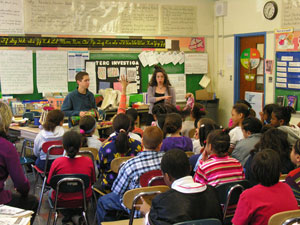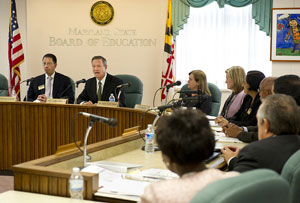Why Music Is Important: Education
The greatest investment any society can make is in the education of the young. I think the Founding Fathers would have agreed with this, as would the ancient Greeks.

Without education, there is ignorance and where there is ignorance there is poverty and, from the cesspit of poverty emanates horrors such as famine, deadly epidemics, drug addiction, crime, terrorism and serial violence. If you believe this as I do, we can perhaps examine some alternative scenarios to events over the last 10 years. Imagine if instead of spending billions of dollars on invasions and bombings, we had used the same resources to fund educational systems, build infrastructure, and provide medical care in the Middle East and beyond. That might have brought sustainable peace and rehabilitated America’s badly tarnished image.

Perhaps that is a naïve dream. But what of our own country? In the U.S., we suffer from unconscionable levels of poverty despite being the world’s wealthiest nation. The statistics are dismal: In 2010, 46.9 million people were living in poverty, up from 37.3 million in 2007. That’s 15.1 percent of the population, up from 12.5 percent in 1997. Also in 2010, 17.2 million households or 14.5 percent of households (approximately one in seven), were food insecure, the highest number ever recorded in the United States.
Then, there is the public education system serving our communities. What should be a non-partisan priority investment has become a pawn for politicians. What was an exemplary system of education to which the whole world looked just a few decades ago, has become a rusted wreck. Check out the analysis by my fellow Huffington Post blogger Jack Jennings, who recently retired after 17 years directing the Center on Education Policy. Not surprisingly, our education system is criticized, pilloried by parents, children, and government. Our politicians, whether they are Democrat or Republican, do not see education as a birthright. It is there to be fiddled with, subjected to some of the most corrosive and destructive policies.Do I really have to analyze what effects this is having on our young people? Does it not scream at us?

Such policies explain the deep negativity so many young people have toward education, particularly in the Latino and African American communities. What should be the privilege of knowledge and creativity, becomes the sad residue of budgetary cuts, restrictive union work rules, inequality of opportunity, and curriculum tinkering. So is this the country we want to promote? Greater social divide? Greater poverty? Greater ignorance? A fertile foundation for crime and urban ghettos? We really should stop and think and look at hard evidence and plan for a world that the founding fathers would recognize as one they would be proud to see as their legacy. And music belongs front and center in all this.


No comments yet.
Add your comment